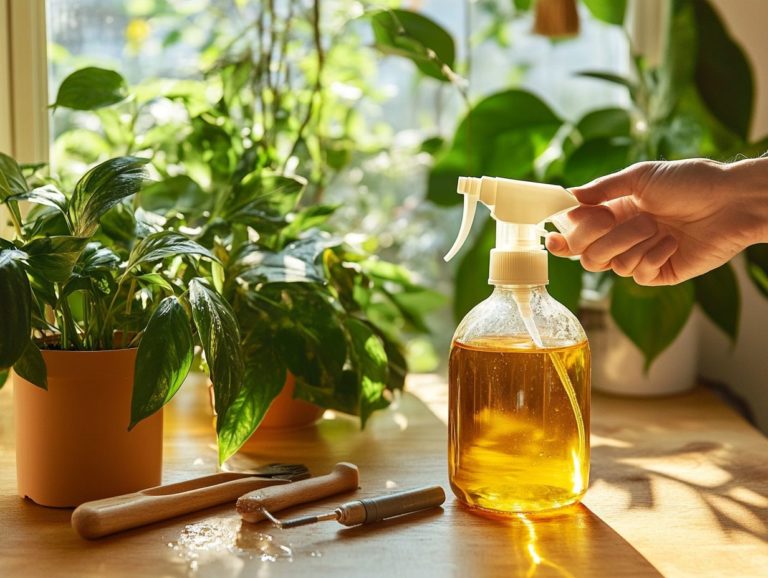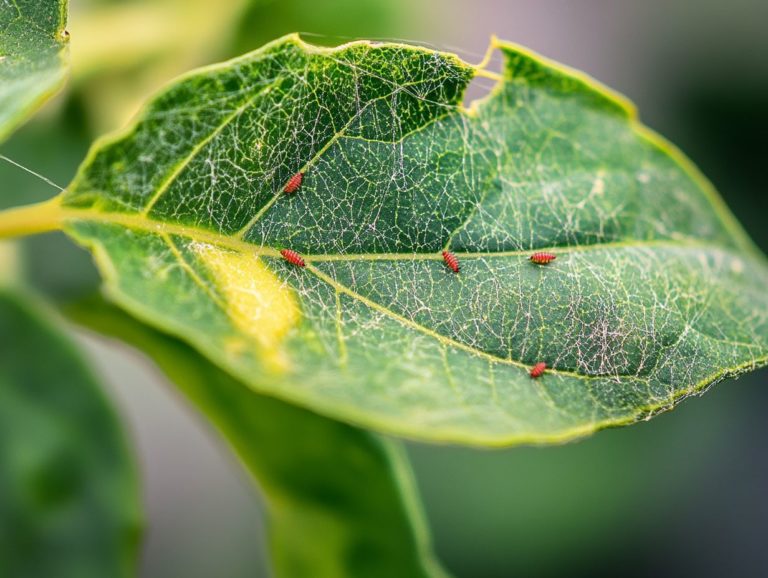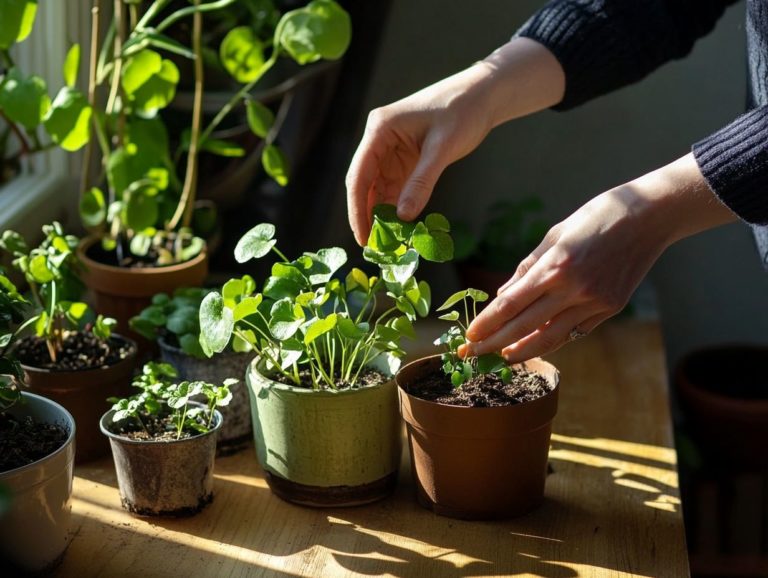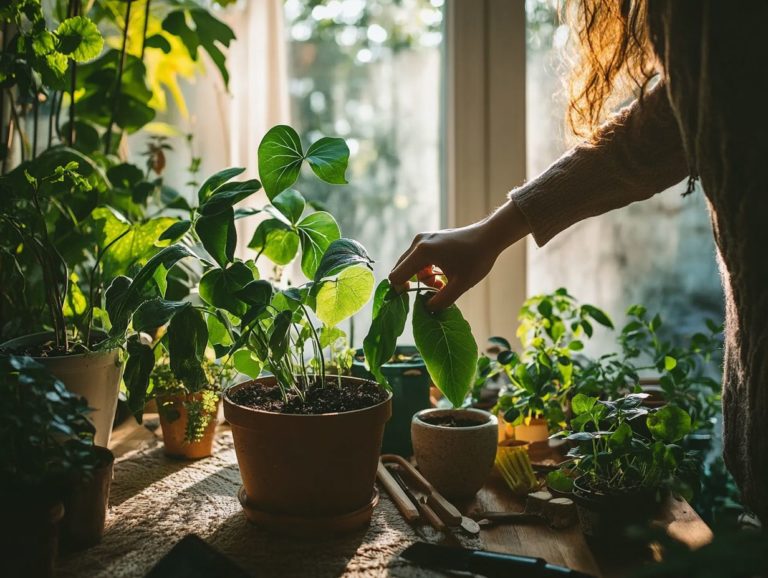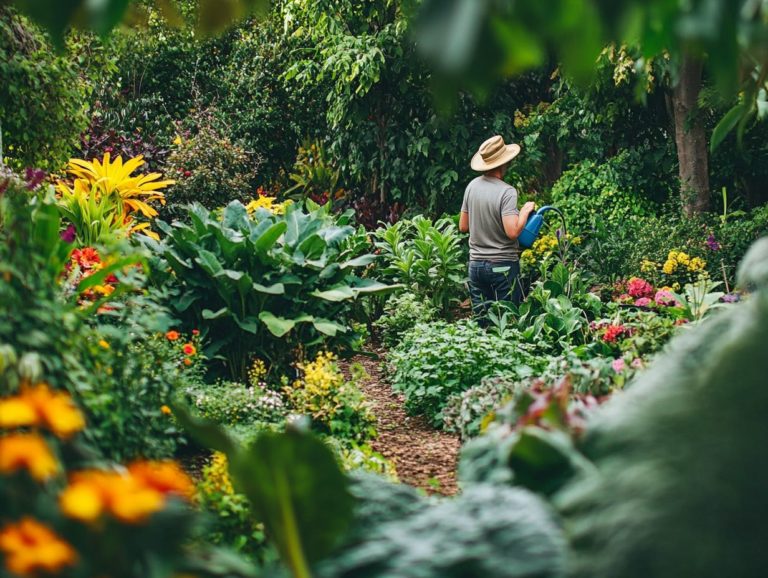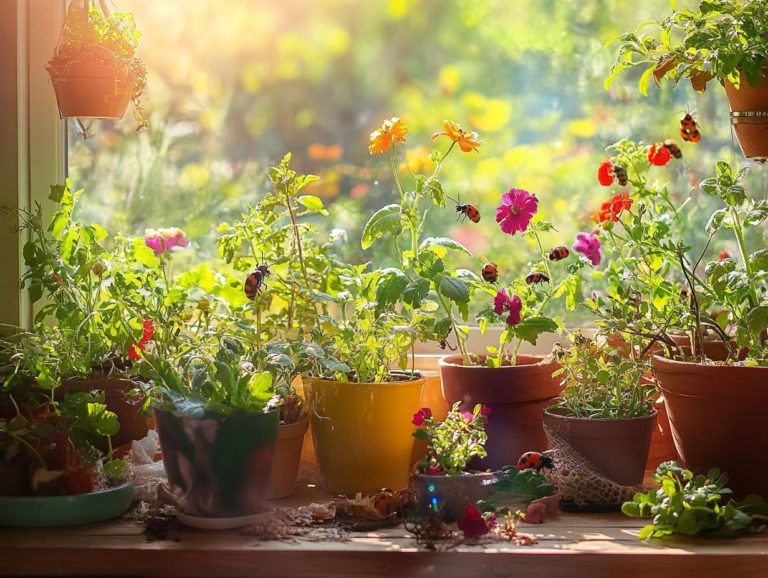Essential Oils for Pest Control in Indoor Plants
Indoor plants can infuse your space with life and freshness. Yet, they often find themselves at the mercy of pests. This article delves into the realm of essential oils as a natural and effective solution for pest control.
You ll learn how to identify common leaf-sucking pests, which are pests that feed on plant sap. You will also discover the best oils for specific pests.
Along with practical application tips, this article shares proactive strategies to ensure your plants remain healthy and vibrant.
Start your adventure to create a pest-free green sanctuary now using these eco-friendly methods!
Contents
- Key Takeaways:
- Common Pests in Indoor Plants
- Benefits of Using Essential Oils for Pest Control
- Top Essential Oils for Pest Control
- How to Use Essential Oils for Pest Control
- Preventing Pests in Indoor Plants
- Frequently Asked Questions
- What are essential oils and how can they be used for pest control in indoor plants?
- Which essential oils are most effective for pest control in indoor plants?
- How do I use essential oils for pest control in my indoor plants?
- Are essential oils safe to use for pest control in indoor plants?
- Can I mix different essential oils for pest control in my indoor plants?
- Are there any other benefits of using essential oils for pest control in indoor plants?
Key Takeaways:
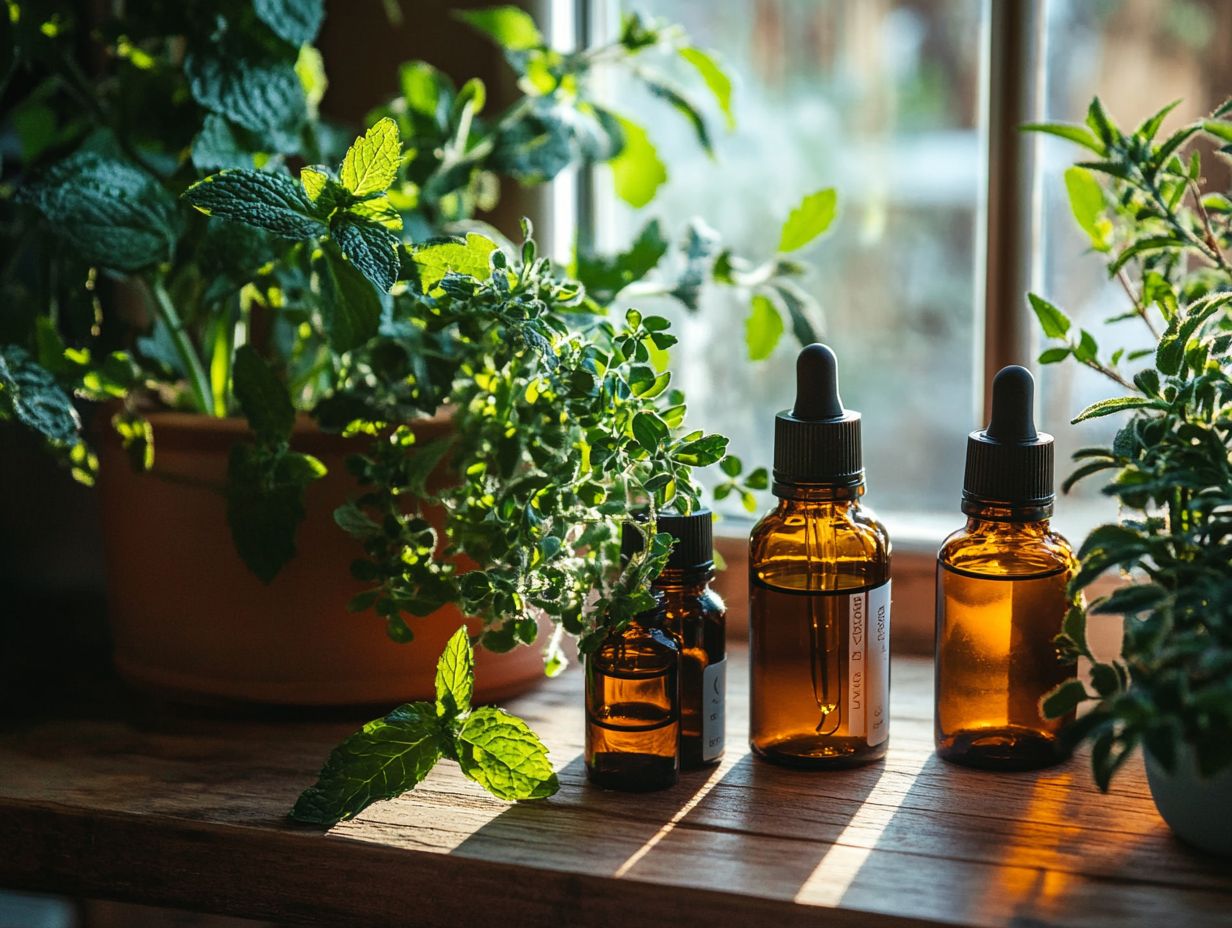
- Essential oils offer a natural and non-toxic solution to control common pests in indoor plants.
- Different essential oils are effective against specific types of insects, making them a versatile and targeted pest control option.
- Taking proactive measures such as proper plant care and regular cleaning can help prevent pest infestations in indoor plants.
What are Essential Oils?
Essential oils are concentrated extracts from various plants. These oils not only make your indoor spaces smell wonderful; they can also work as effective homemade pesticides to keep pests away.
Each essential oil offers unique benefits. They support the health and well-being of your indoor plants while providing natural remedies against pesky leaf-sucking invaders like mealybugs and aphids.
Rooted in ancient practices, essential oils have been distilled from flowers, leaves, and roots for centuries. Techniques like steam distillation or cold pressing ensure that the natural compounds remain intact, delivering maximum effectiveness.
Certain oils like neem, peppermint, and eucalyptus shine for their pest-repelling properties. Neem oil disrupts the life cycle of pests, while peppermint s strong scent acts as a powerful deterrent.
By harnessing these oils, you not only protect your plants but also nurture their overall plant health. This boosts their resilience against common pests.
Common Pests in Indoor Plants
Indoor plants frequently face infestations from common pests. Pests like mealybugs, aphids, and spider mites suck sap from leaves, harming plant health.
Gaining a solid understanding of these pests is essential for effective pest control. This knowledge allows you to nurture a flourishing indoor garden with ease.
Identifying and Understanding Common Pests
Identifying common pests like mealybugs and aphids is essential for your indoor plant care. Early detection can save you from more extensive damage down the line.
These pesky intruders often hide on the undersides of leaves or around leaf joints. They cause significant harm by feasting on your plants’ precious sap, which is the fluid that nourishes them.
Take mealybugs, for example; they typically produce a white, cottony substance and love to cluster in those hard-to-see crevices. Aphids, on the other hand, are smaller, can range in color from green to black, and often gather in groups on new growth.
Regularly inspecting your plants for these signs is crucial. Neglect can lead to a rapid population boom. Look out for symptoms like yellowing leaves, stunted growth, or an unpleasant sticky residue on surfaces these can all signal a burgeoning infestation.
By closely monitoring your indoor plants, you not only protect them from extensive damage but also ensure their overall health. Start using essential oils today to enhance your pest control efforts!
Benefits of Using Essential Oils for Pest Control
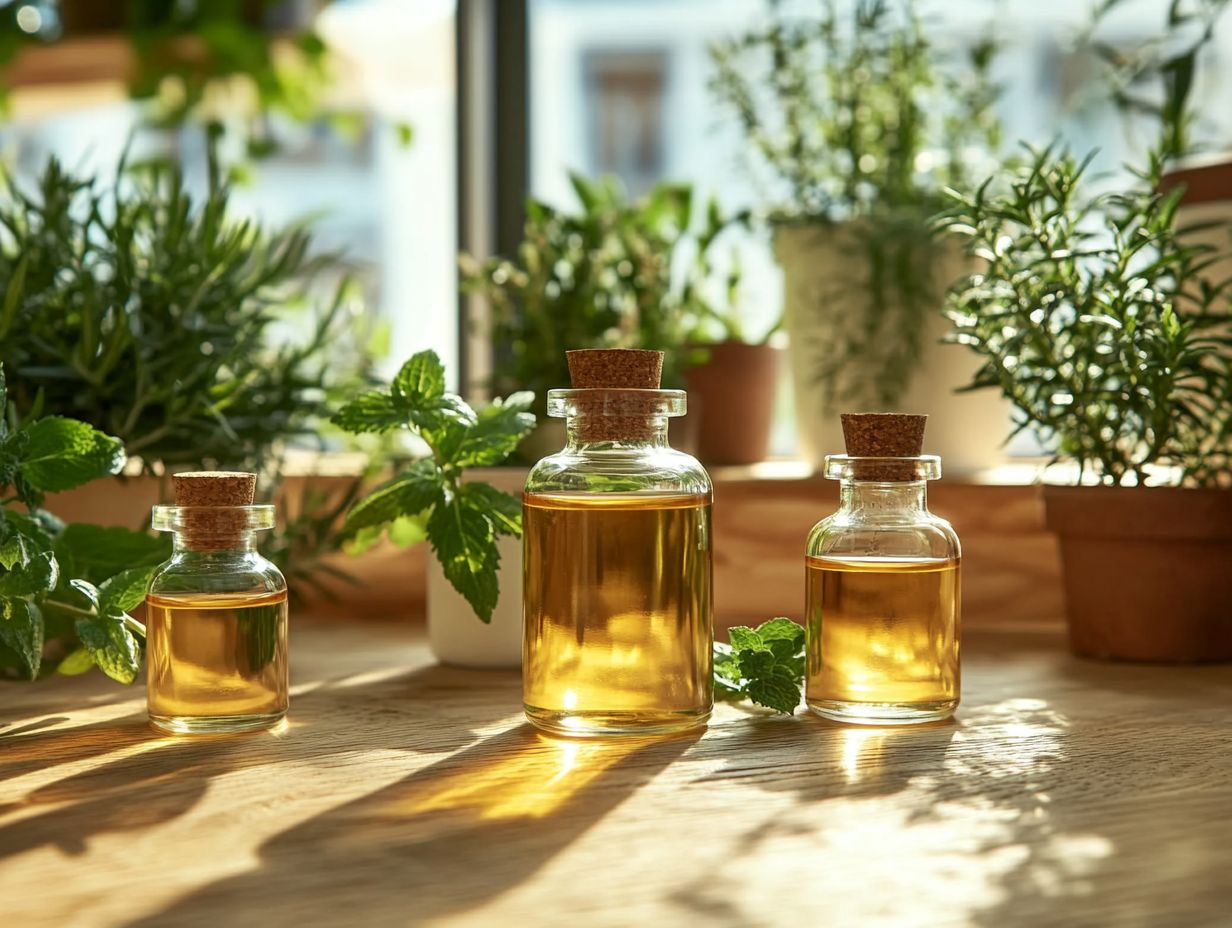
Using essential oils for pest control presents a wealth of advantages. They are an excellent option for nurturing plant health without resorting to harsh chemicals.
These natural insecticides effectively keep away common pests while remaining safe for indoor spaces. This fosters a healthier ecosystem for your plants.
By crafting your own homemade pesticide solutions with ingredients like vegetable oil and garlic spray, you can shield your indoor plants from infestations while promoting their growth and vitality.
Natural and Non-Toxic Solutions
Natural and non-toxic solutions for pest control are crucial for maintaining a safe indoor environment, especially in homes with pets and children.
By choosing these alternatives, you can effectively address common household pests without bringing harmful chemicals into your living space.
Consider essential oils like peppermint, neem, and tea tree oil. When combined with water, they create sprays that naturally deter insects.
Simple household ingredients such as vinegar or garlic enhance the effectiveness of these mixtures and contribute to a healthier ecosystem around your plants.
You can easily prepare these homemade remedies, enabling you to take an active role in protecting your plants while ensuring a safe environment.
By choosing these easy solutions, you’ll create a healthier environment for your plants!
Top Essential Oils for Pest Control
In the realm of pest control, some essential oils stand out as the best options, thanks to their remarkable effectiveness against a range of pests.
Oils like cinnamon, garlic, and chili function as potent homemade pesticides. They offer you cost-effective and natural solutions for nurturing your indoor plants.
These invaluable oils not only repel pests but also enhance the overall vitality of your plants, ensuring they thrive beautifully.
Effective Oils for Different Types of Pests
Different types of pests require specific strategies, and certain essential oils can be exceptionally effective in tackling these challenges.
For instance, neem oil is celebrated for its prowess in combating mealybugs, while peppermint oil is known to be a formidable foe against spiders.
By familiarizing yourself with which oils work best for different pests, you can craft customized homemade pesticide solutions that significantly enhance the health of your indoor plants.
To use these oils effectively, proper mixing is key. For example, blending neem oil with water and a dash of liquid soap can yield a potent spray.
Similarly, mixing peppermint oil with water can create a repellent for those pesky arachnids.
These targeted applications not only reduce harm to beneficial insects but also contribute to a more harmonious ecosystem.
As you explore these options, you’ll ensure a safer environment for your plants while proactively fighting off pest invasions.
How to Use Essential Oils for Pest Control
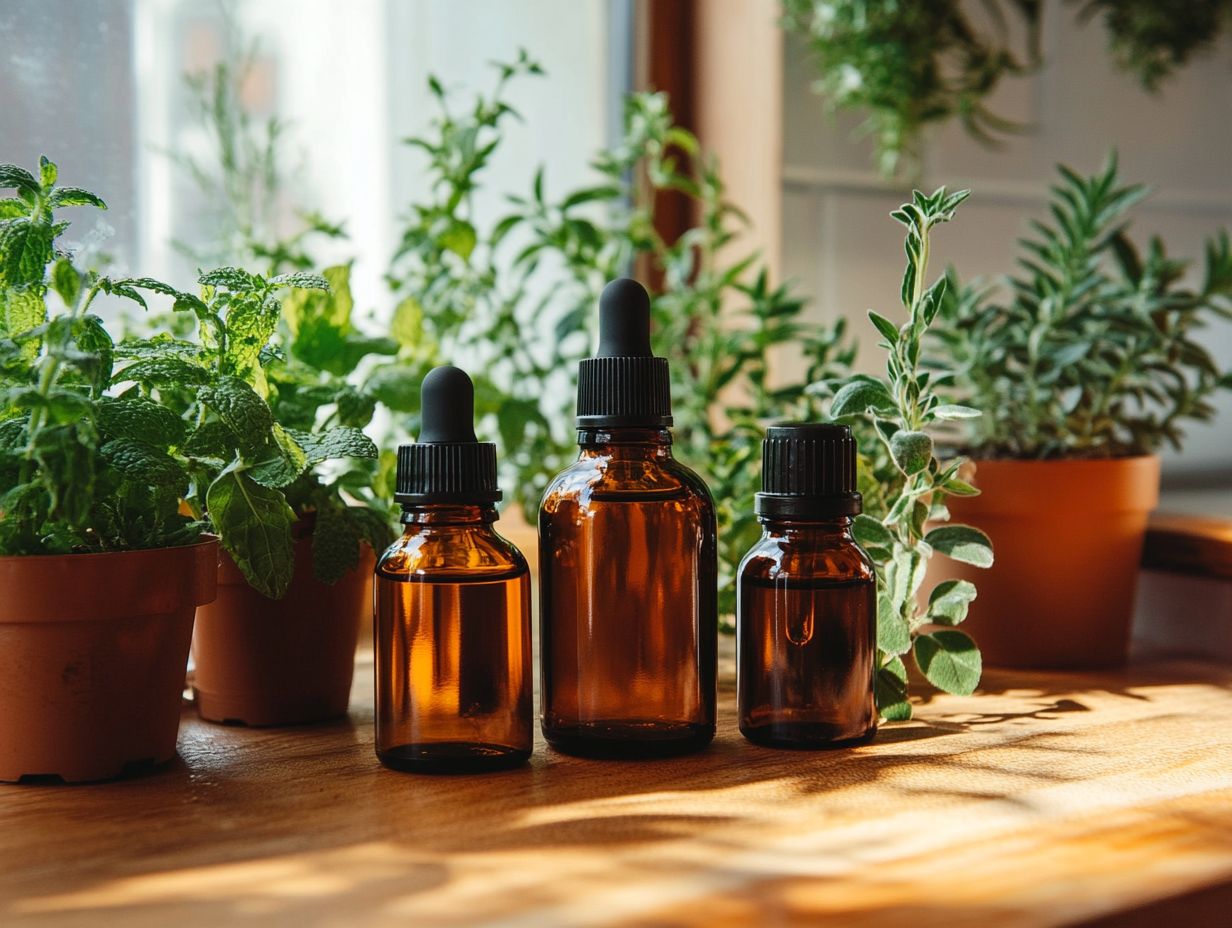
To use essential oils effectively, you need to know how to apply them properly. Understanding application methods and dilution ratios ensures both safety and efficacy.
By preparing properly diluted solutions, you can craft homemade pesticides that are powerful against pests but also safe for your indoor plants.
Mastering these techniques can significantly elevate your pest management efforts. This will allow you to maintain a thriving garden with confidence.
Application Methods and Tips
There are various methods for using essential oils in pest control, each providing unique advantages and effectiveness. Techniques such as spray applications, soaks, and using essential oils when you clean your home can elevate your pest management efforts while nurturing plant health. By understanding these methods, you can craft more successful homemade pesticide treatments.
To utilize these techniques effectively, you first need to assess the type of pest you’re dealing with and the specific needs of your plants. For spray applications, combine a few drops of essential oil with water in a spray bottle and apply it early in the morning or late in the evening, when pests are at their most active.
When soaking, prepare a mixed solution in a basin and allow the plant’s root system to absorb it, keeping an eye on the water uptake.
Cleaning with essential oils involves mixing oil with a gentle cleanser and gently wipe down the leaves to eliminate pests while enhancing air quality.
Regular observation of your plants is essential to detect any signs of improvement or distress, allowing you to adjust the frequency and concentration based on their responses. Watch for changes like improved leaf health or decreased pest activity to assess the effectiveness of your chosen method.
Preventing Pests in Indoor Plants
Preventing pests in your indoor plants is essential for maintaining their health and nurturing a flourishing indoor garden. By taking proactive measures such as regularly cleaning the leaves, utilizing sticky bug traps, and implementing natural pest deterrents you can significantly diminish the risk of infestations.
By weaving these practices into your houseplant care routine, you’ll create a thriving environment that allows your plants to flourish.
Proactive Measures and Tips
Implementing proactive measures is essential for effective pest prevention in your indoor plants, ensuring their health and vitality. Monitoring humidity levels and providing adequate sunlight or grow lights will create an environment that’s unwelcoming to pests. These simple practices can make a big difference in keeping your indoor plants pest-free.
To further enhance the protection of these vibrant green companions, consider incorporating a weekly check-up routine. This not only allows you to spot early signs of pests but also encourages adjustments in your care practices based on seasonal changes. Utilizing household items, such as a diluted solution of dish soap or neem oil, can serve as a gentle deterrent against unwanted intruders. Placing diatomaceous earth a natural powder made from tiny fossilized aquatic organisms around pots acts as a barrier to keep pests away.
By maintaining a consistent watering schedule and regularly rotating your plants for balanced light exposure, you significantly decrease the likelihood of pest infestation and ensure your plants receive necessary plant nutrients.
Frequently Asked Questions
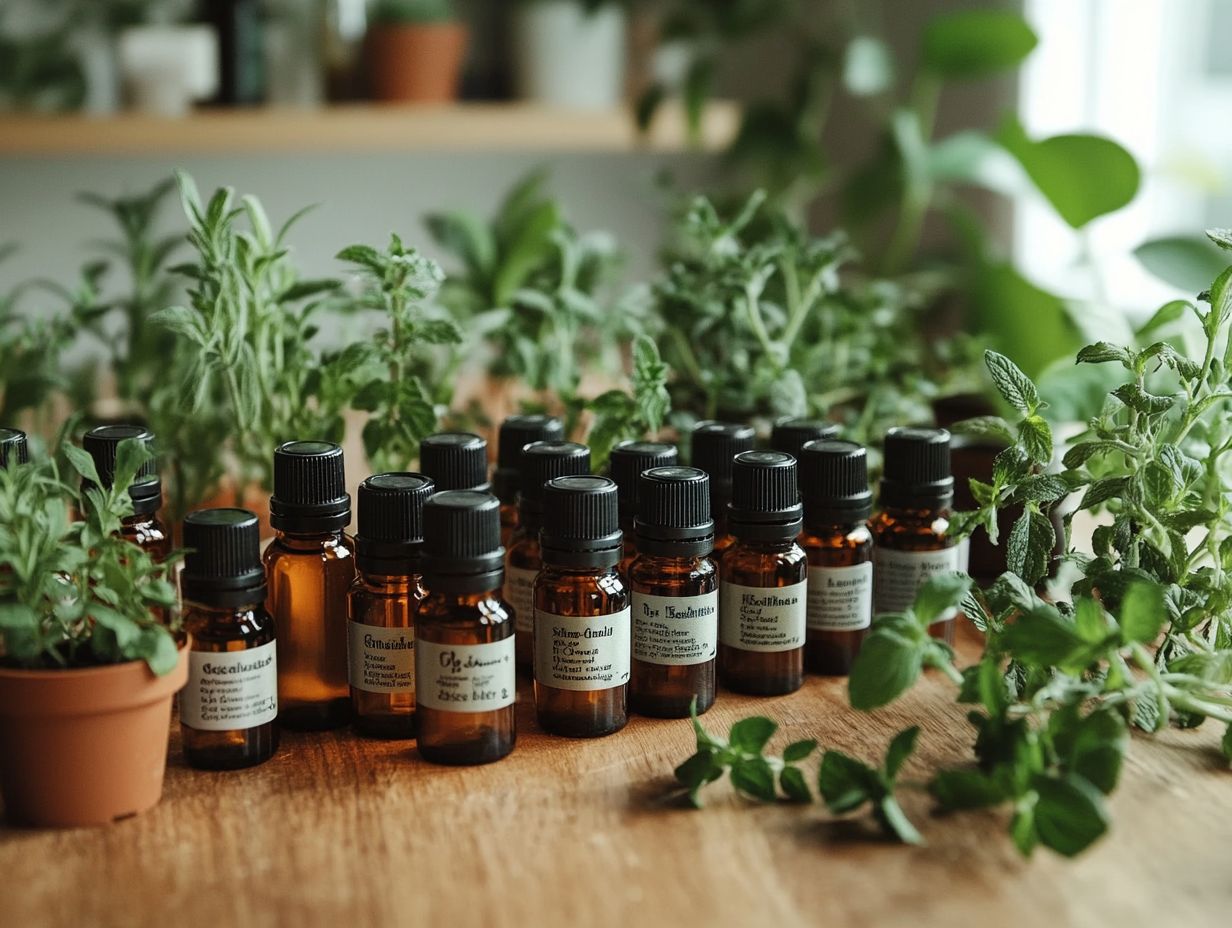
What are essential oils and how can they be used for pest control in indoor plants?
Essential oils are natural oils extracted from plants that contain their characteristic scent and properties. They can be used as a natural alternative to chemical pesticides for controlling pests in indoor plants.
Which essential oils are most effective for pest control in indoor plants?
Some of the most effective essential oils for pest control in indoor plants include peppermint, neem, eucalyptus, tea tree, and lavender. These oils have strong scents that repel pests and can also have insecticidal properties.
How do I use essential oils for pest control in my indoor plants?
Essential oils can be used in a variety of ways for pest control in indoor plants. You can dilute a few drops of the oil in water and spray it on the plant, add a few drops to a diffuser near the plant, or apply it directly to the affected areas of the plant.
Are essential oils safe to use for pest control in indoor plants?
Yes, essential oils are generally safe to use for pest control in indoor plants. However, it is important to use them in moderation and always dilute them with water before application. Some essential oils can harm pets, so always check their safety first.
Can I mix different essential oils for pest control in my indoor plants?
Yes, you can mix different essential oils for pest control in your indoor plants! Mixing oils often makes them more effective.
Be sure to use the recommended dilution ratio, which is the amount of essential oil mixed with a carrier substance like water. Always conduct a patch test on a small area of the plant before widespread use.
Are there any other benefits of using essential oils for pest control in indoor plants?
Essential oils do more than repel pests. Oils like lavender and eucalyptus can protect plants from diseases due to their antibacterial and antifungal properties.
The fragrant scents of essential oils also act as natural air fresheners for your home!
Try mixing your oils today for a healthier, pest-free home!

